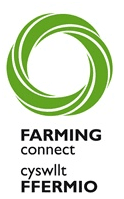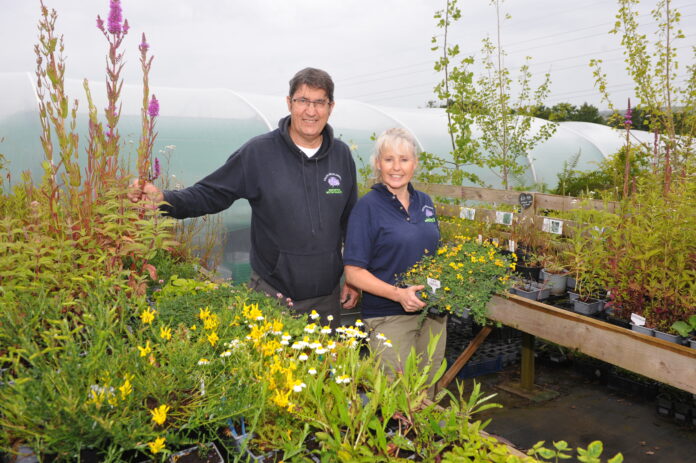 Yellow clusters of Kidney Vetch and the tiny daisy-like flowers of the Chamomile jostle for position among the summer’s colourful arrivals at a specialist nursery dedicated to aiding nature recovery in the Welsh countryside.
Yellow clusters of Kidney Vetch and the tiny daisy-like flowers of the Chamomile jostle for position among the summer’s colourful arrivals at a specialist nursery dedicated to aiding nature recovery in the Welsh countryside.
Barry and Sandra Stewart had little experience of cultivating wildflowers when they established Celtic Wildflowers near Swansea but they filled gaps in their knowledge by drawing on free advice and services available through Farming Connect’s horticulture team and are now leading suppliers of around 300 species.
“We feel like we have been taken under Farming Connect’s wing, that we have this little support network to tap into when we need a helping hand,” says Barry.
The business has the Marsh Fritillary butterfly and Devil’s-bit Scabious, the food source of this rare insect’s offspring, to thank in part for its origins.
Barry had been invited in his capacity as an ecological consultant to grow the plant to provide habitat for this endangered butterfly as there were no growers producing it in sufficient quantities in Wales.
The Stewarts grew around 5,000 to plant on a site near Hirwaun where the Marsh Fritillary naturally occurs.
“We planted them in pretty horrific conditions in the middle of winter and went back to inspect them nine months later and were gob smacked by their survival, they had not only survived but they were in flower and had increased the ecological value of the site,” Barry recalls.
Soon he was asked to grow plants for other pollinators that were in decline, including Kidney Vetch for the Small Blue butterfly.
“Once we started growing, within 18 months we had 250 species under way,” says Barry.
“It was like a revolution, people were saying “my goodness, people are growing Welsh native plants”. People really got on board and it gave us the impetus to go further.”
After a year of cultivating pollinator species, the Stewarts introduced trees and shrubs and now grow most of the native species found in Wales.
They put much of their success down to their employees and volunteers, Nancy Minopoli, Laura Norman, Corrinne Bennow and Angela Reed, and Sandra’s step-father, Jeff Lewis, and also credit the Farming Connect horticulture team led by Sarah Gould for stepping in when they need extra support.
“If Sarah thinks there is an opportunity for us, she will make us aware of it and will do her very best to help us access it,” says Sandra, a former primary school teacher.
“We feel like we have always got someone we can turn to, that we are not on our own, that we are connected to a big organisation that provides support.”
That support started with some free internet sessions with a software expert when the couple were considering overhauling their website.
Through Farming Connect Horticulture Business Support, they also had fully funded visits from ADAS advisor Chris Creed when they needed advice on natural pest control and plant nutrition.
Celtic Wildflowers is located on an acre of land rented from the RSPCA at Llys Nini Animal Centre, Penllergaer.
Although the Stewarts have been offered opportunities to expand, after four years of business growth their plan for now is to consolidate and focus on what they have.
All the plants are grown from seed, many harvested with special permission from landowners.
With each taking upwards of six months to grow, Barry admits a crystal ball would be useful for predicting which plants customers will want to buy in the future.
There are few plants that have confounded them but Whorled Caraway is one of a few exceptions.
It grows naturally in only two sites in the UK, the South Wales coalfields and Dumfriesshire, and it is the one plant that the Stewarts struggle to grow.
But with 300 different varieties for sale, as failures go it is a minor one.
As they look to the future, Barry, Sandra and the team at Celtic Wildflowers are confident that the work they are doing can make a difference to the environment.
“We started our business because we care passionately about the environment and because we wanted to make a difference, and we believe we can make a difference,” says Sandra.
With their first resounding endorsement coming from one of Europe’s rarest butterflies, there is absolutely no doubt that they will make a difference.
Help keep news FREE for our readers
Supporting your local community newspaper/online news outlet is crucial now more than ever. If you believe in independent journalism, then consider making a valuable contribution by making a one-time or monthly donation. We operate in rural areas where providing unbiased news can be challenging. Read More About Supporting The West Wales Chronicle

























What an inspiring journey! Barry and Sandra Stewart’s dedication to growing native Welsh plants at Celtic Wildflowers is making a real difference,supporting endangered species like the Marsh Fritillary butterfly and enhancing local ecology. Their work,bolstered by Farming Connect’s support,shows the powerful impact small businesses can have on the environment. Kudos to the Celtic Wildflowers team!
Comments are closed.